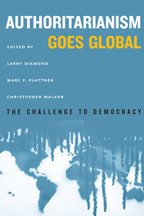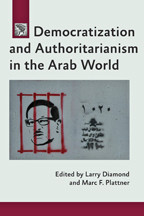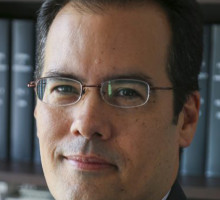Explores how authoritarian regimes are deploying "sharp power" to undermine democracies from within by weaponizing universities, institutions, media, technology, and entertainment industries.
The world's dictators are no longer content with shoring up control over their own populations—they are now exploiting the openness of the free world to spread disinformation, sow discord, and suppress dissent. In Defending Democracy in an Age of Sharp Power, editors William J. Dobson, Tarek Masoud, and Christopher Walker bring together leading analysts to explain how the world's authoritarians are...
Explores how authoritarian regimes are deploying "sharp power" to undermine democracies from within by weaponizing universities, institutions, media, technology, and entertainment industries.
The world's dictators are no longer content with shoring up control over their own populations—they are now exploiting the openness of the free world to spread disinformation, sow discord, and suppress dissent. In Defending Democracy in an Age of Sharp Power, editors William J. Dobson, Tarek Masoud, and Christopher Walker bring together leading analysts to explain how the world's authoritarians are attempting to erode the pillars of democratic societies—and what we can do about it.
Popular media, entertainment industries, universities, the tech world, and even critical political institutions are being manipulated by dictators who advance their regimes' interests by weakening democracies from within. Autocrats' use of "sharp power" constitutes one of the gravest threats to liberal, representative government today. The optimistic, early twenty-first-century narrative of how globalization, the spread of the internet, and the rise of social media would lead to liberalization everywhere is now giving way to the realization that these same forces provide inroads to those wishing to snuff out democracy at the source. And while autocrats can do much to wall their societies off from democratic and liberal influences, free societies have not yet fully grasped how they can resist the threat of sharp power while preserving their fundamental openness and freedom.
Far from offering a counsel of despair, the international contributors in this collection identify the considerable resources that democracy provides for blunting sharp power's edge. With careful case studies of successful resistance efforts in such countries as Australia, the Czech Republic, and Taiwan, this book offers an urgent message for anyone concerned with the defense of democracy in the twenty-first century.
Contributors: Ketty W. Chen, Sarah Cook, William J. Dobson, John Fitzgerald, Martin Hála, Samantha Hoffman, Aynne Kokas, Edward Lucas, Tarek Masoud, Nadège Rolland, Ruslan Stefanov, Glenn Tiffert, Martin Vladimirov, Christopher Walker







